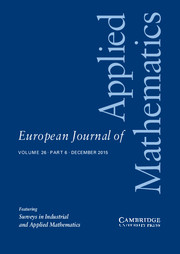Crossref Citations
This article has been cited by the following publications. This list is generated based on data provided by
Crossref.
Vellela, Melissa
and
Qian, Hong
2009.
Stochastic dynamics and non-equilibrium thermodynamics of a bistable chemical system: the Schlögl model revisited.
Journal of The Royal Society Interface,
Vol. 6,
Issue. 39,
p.
925.
Erban, Radek
Chapman, S. Jonathan
Kevrekidis, Ioannis G.
and
Vejchodský, Tomáš
2009.
Analysis of a Stochastic Chemical System Close to a SNIPER Bifurcation of Its Mean-Field Model.
SIAM Journal on Applied Mathematics,
Vol. 70,
Issue. 3,
p.
984.
Bressloff, Paul C.
2010.
Stochastic Neural Field Theory and the System-Size Expansion.
SIAM Journal on Applied Mathematics,
Vol. 70,
Issue. 5,
p.
1488.
Tania, Nessy
and
Keener, James P.
2010.
Calsequestrin mediates changes in spontaneous calcium release profiles.
Journal of Theoretical Biology,
Vol. 265,
Issue. 3,
p.
359.
Qian, Hong
and
Bishop, Lisa M.
2010.
The Chemical Master Equation Approach to Nonequilibrium Steady-State of Open Biochemical Systems: Linear Single-Molecule Enzyme Kinetics and Nonlinear Biochemical Reaction Networks.
International Journal of Molecular Sciences,
Vol. 11,
Issue. 9,
p.
3472.
Bressloff, Paul C.
2010.
Metastable states and quasicycles in a stochastic Wilson-Cowan model of neuronal population dynamics.
Physical Review E,
Vol. 82,
Issue. 5,
Keener, James P.
and
Newby, Jay M.
2011.
Perturbation analysis of spontaneous action potential initiation by stochastic ion channels.
Physical Review E,
Vol. 84,
Issue. 1,
Newby, Jay M.
and
Keener, James P.
2011.
An Asymptotic Analysis of the Spatially Inhomogeneous Velocity-Jump Process.
Multiscale Modeling & Simulation,
Vol. 9,
Issue. 2,
p.
735.
Martirosyan, A.
and
Saakian, David B.
2011.
Exact results in the large system size limit for the dynamics of the chemical master equation, a one dimensional chain of equations.
Physical Review E,
Vol. 84,
Issue. 2,
Newby, Jay M
2012.
Isolating intrinsic noise sources in a stochastic genetic switch.
Physical Biology,
Vol. 9,
Issue. 2,
p.
026002.
Bressloff, Paul C.
2014.
Waves in Neural Media.
p.
137.
Bressloff, Paul C.
2014.
Waves in Neural Media.
p.
349.
Bressloff, Paul C.
2014.
Stochastic Processes in Cell Biology.
Vol. 41,
Issue. ,
p.
103.
Bressloff, Paul C.
2014.
Stochastic Processes in Cell Biology.
Vol. 41,
Issue. ,
p.
577.
Newby, Jay
and
Chapman, Jon
2014.
Metastable behavior in Markov processes with internal states.
Journal of Mathematical Biology,
Vol. 69,
Issue. 4,
p.
941.
Bressloff, Paul C.
2014.
Waves in Neural Media.
p.
101.
Bruna, Maria
Chapman, S. Jonathan
and
Smith, Matthew J.
2014.
Model reduction for slow–fast stochastic systems with metastable behaviour.
The Journal of Chemical Physics,
Vol. 140,
Issue. 17,
Bressloff, Paul C.
2014.
Waves in Neural Media.
p.
3.
Rüdiger, S.
2014.
Excitability in a stochastic differential equation model for calcium puffs.
Physical Review E,
Vol. 89,
Issue. 6,
Bressloff, Paul C.
2014.
Waves in Neural Media.
p.
319.




